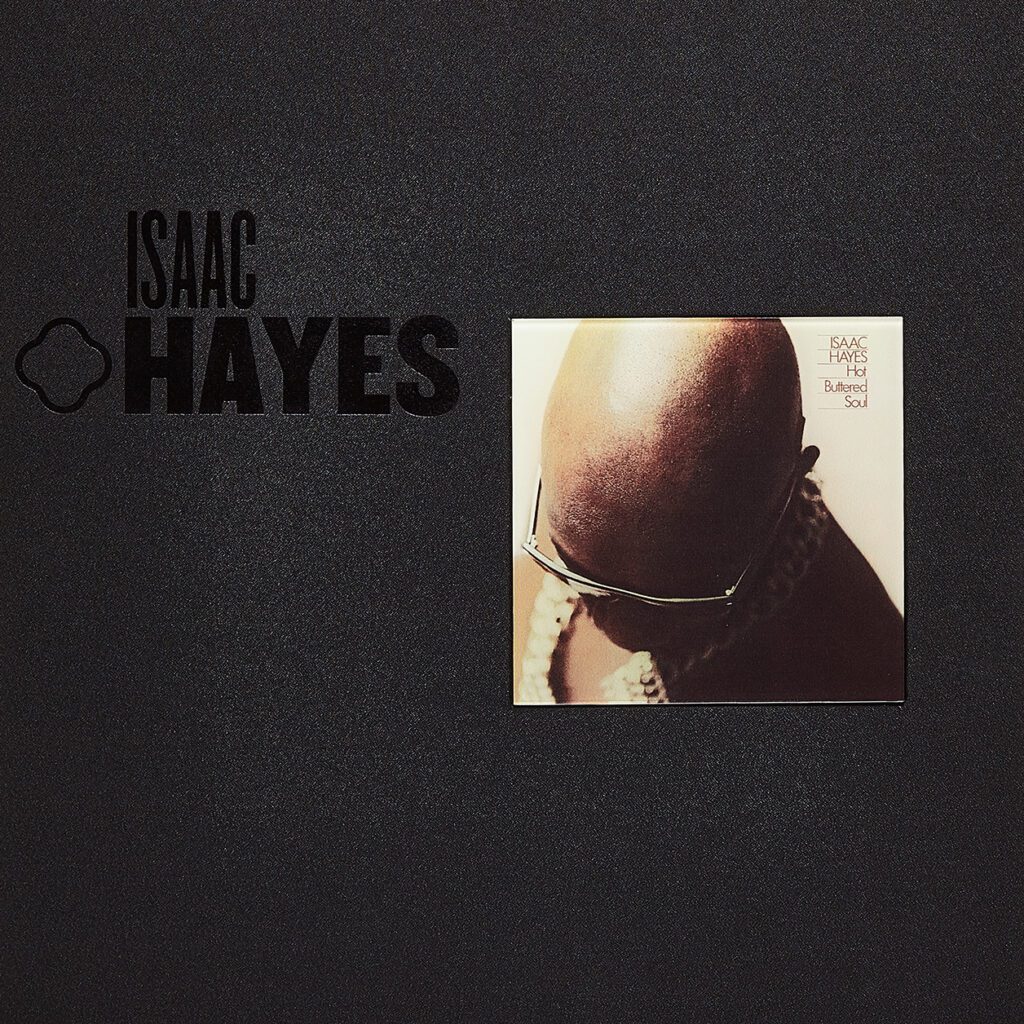Released in 1969, Hot Buttered Soul brought Isaac Hayes widespread attention as he helped lead the charge into a new decade of soul music innovations. An impeccable album in a genre that hitherto had been largely dominated by singles, Hayes’ achievement is a perfect addition to Craft Recordings’ Small Batch series. Pressed on 180 gram vinyl at RTI with Neotech’s VR900 compound using lacquers cut from the master tapes by Bernie Grundman, the edition of 3,000 is available March 1.
Given how Hot Buttered Soul has consistently pulled in new listeners across a span of generations since its smash hit release, it can be easy to misplace the record’s reality as a groundbreaker. Featuring two songs on each side, the LP did something almost unheard of, hitting the marketplace without any accompanying singles; radio edits of “Walk on By” and “By the Time I Get to Phoenix” were subsequently issued (and charted) after the record’s unexpected success.
That Stax (through subsidiary Enterprise) allowed Hayes such creative freedom is not only unusual but also pretty risky, as the set’s bold conception couldn’t have been inexpensive. The scoop is that Hot Buttered Soul became a reality through Stax honcho Al Bell’s directive to the label’s active roster to cut a slew of albums for release in a very tight timeframe, a decision made because Stax had lost its entire back catalog to Atlantic Records.
Presenting Isaac Hayes, the artist’s debut from 1968, proved a disappointment, and to nobody more than Hayes himself, who responded to Bell’s album initiative with a demand for complete creative control. That the resulting LP received the necessary promotional push to take root with consumers and then catch fire is testament to Hayes’ talent but also to Bell’s stature as a record man.
Most importantly, Hot Buttered Soul is a just a stylistic tour de force. Those fuzz guitar lines in “Walk on By” are an exemplary representation of the era’s psychedelic-soul impulse, while the boldness of Hayes’ soon to be signature symphonic approach is distinct from how Motown’s applied smoother strings and horns to their generally more sophisto brand of R&B. In “Walk on By,” Harold Beane’s burning guitar blends with the symphonic sweep (added later during sessions in Detroit) in a novel fashion, as Hayes’ Hammond organ soars. It’s truly a sound for the ages.
“Hyperbolicsyllabicsesquedalymistic” retains the psych-soul feel but combines it with a faultless groove courtesy of Bar-Kays’ Michael Toles (guitar), James Alexander (bass), and Willie Hall (drums). It really can’t be stressed enough just how right the band gets it, hitting the pocket and staying in that zone with the knowledge that they have nothing to prove. Hot Buttered Soul is devoid of overplaying; it’s not flashy, but “Hyperbolicsyllabicsesquedalymistic” is downright funky.


Side two’s opener “One Woman” is the least discussed track on the album, but in no way is it a lesser item. Instead, this serving of uplift, subtly gospel-tinged and complete with gal backing vocals, deepens the set’s overall impact. Moving onward, some have asserted that Hayes’ eight-minute spoken intro to “By the Time I Get to Phoenix” undercuts the record’s effectiveness in terms of repetition on the turntable, but frankly that’s a spurious notion promulgated by those who’ve never been stricken by heartbreak.
In this album’s context, Hayes is a storyteller of hurt, indeed a truth teller, and the musical pulse that accompanies him is pure cinematic tension (the soundtrack to Shaft was just around the corner). Finally, it’s striking just how effectively Hayes transforms compositions by Burt Bacharach and Jimmy Webb into potent soul firepower on Hot Buttered Soul. As this gem of an edition plays, it’s crystal clear that groove science applied to masterful songwriting is a recipe for endurance across the decades.
GRADED ON A CURVE:
A+
